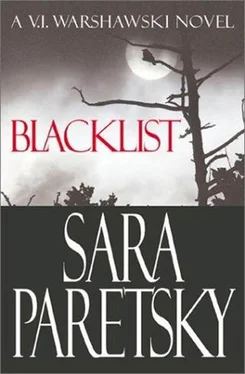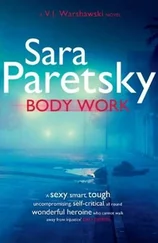“Catherine says her grandfather has a key to Larchmont Hall, that he uses it to let himself in there at night. Is that possible? When I asked Darraugh, he became angry and hung up on me. Why?”
Ms. Graham put her down cup, her jaw working. “Do you have children, young woman? No? They are a mystery. You bear them in your body, you watch over them, but they grow up as strangers. Darraugh’s anger is one of those mysteries to me.”
Once again she danced away from talking about Darraugh and Larchmont. I reverted to the key: Would Calvin Bayard have one?
“I should be most surprised. But we live in a very odd world. Are they looking after him properly? How did he seem?”
“The nurse seems competent. He looks physically fit. He thought I was
his wife. He clung to me and called me `Deenie.’ I always admired himthat was hard.”
Ms. Graham’s hands shook as she picked up her cup. Coffee slopped over the edge and onto her aqua silk skirt. “So clumsy,” she murmured. “The thought of Calvin with his wits wandering is truly unsettling. Send Lisa to me on your way out, young woman.”
My exit cue. I didn’t need to summon Lisa: the maid continued to hover within earshot. As I let myself out, I could hear her clucking soothingly to Geraldine Graham, mother calming infant. The smell on Mr. Bayard’s clothes, urine and talc, came back over me in a shuddering wave. That we all come to this, no matter how far or fast we run, we come to this, not away from it.
Lair of a Star Chamber Man
The emotions of the afternoon left me limp. I didn’t go to my car, but walked aimlessly along the paths that wound through Anodyne Park. Night had fallen while I was in with Geraldine, but the paths were well dotted with fake gas lamps and I found my way easily. Not that I exactly knew what my way was, right now.
It was that time of evening when people were out with their dogs, or heading over to the bar on the shopping strip for a drink. I thought about following a dour couple into the bar, but I’d had too much company the last few hours. I kept walking.
I was too tired to try to make sense of everything I’d heard this afternoon, but the image of Geraldine and her mother kept floating in my mind, Geraldine’s futile rebellions culminating in her unhappy marriage. Culminating, really, in her son Darraugh’s wintry personality. I imagined scenes at the breakfast table, Laura Drummond giving her son-in-law his coffee with a barbed comment on his character, Geraldine slamming out of the house to do-what? I couldn’t imagine her wasting time over bridge or shopping. I didn’t know how she’d spent the years from 1937 until her mother died.
Beyond the bar, the path made a gentle descent. By and by, I found myself going under Powell Road and rising again onto the Anodyne Park golf course. The course itself was dark, but the occasional lamppost let me see
the path. A late golfing foursome passed, going the other way in their cart. At the top of a rise, I came on the clubhouse, a well-lighted, sprawling building with a rack of golf carts at the far end and a couple of valets moving cars at the other. A wave of laughter rolled toward me. I shuddered away from the jollity.
I scrambled to the top of a hillock and lay on my back looking at the stars. The grass was velvety soft, but cold; it wasn’t long before I started shivering and sneezing. I sat up again and pulled out my cell phone. Maybe I could reach Domingo Rivas, the man who had looked after Olin Taverner. He didn’t have a listed number that I could find, but when I called the Anodyne Park management office and identified myself as a detective they were happy to give me his number: he lived with a married daughter in nearby Lyle.
“I hope there’s not a problem, Detective. Domingo looked after Mr. Taverner as carefully as if he were his own father, and we have recommended him to another older gentleman in our assisted living compound.”
I reassured her, explaining that I just wanted to talk to Mr. Rivas about Marc Whitby’s visit to Olin Taverner. She put me on hold for a minute, then came back on to say that Rivas would be here in an hour to meet with the family of the “gentleman” who might be hiring him.
“We can ask him to stop by the office early to talk to you.”
She gave me directions to the office. I found the underpass from the golf course back into the Anodyne Park community, but once inside the complex, the dark and the winding paths unsettled my sense of direction. I pulled a small flashlight from my bag, but couldn’t make out any building that I recognized. I figured all the paths would end up either at the exit or the bar, and kept going. I was wrong-this particular walkway suddenly ended at a large shrub which caught on my trousers.
As I bent to untangle myself, I dropped my flashlight. Its beam picked out wheel marks going around the evergreen. Curious, I followed them and found myself at the entrance to a culvert. The ground was damp; I saw the tracks easily. It looked as though someone had driven a golf cart through here.
I was tempted to follow the trail to see whether this culvert ended up in New Solway on its far side, but I didn’t want to muck up my good shoes in the damp soil. And I didn’t want to miss Domingo Rivas.
I turned around. More by luck than skill, I found my way to the main part of the complex. A woman walking a toy poodle directed me to the management office.
The office took up a wing of the skilled nursing facility, a building tucked well away from the jolly parts of Anodyne Park so that no one had to think of disagreeable things like dementia or death. The woman on evening duty said, Oh, yes, they were expecting me. Domingo Rivas arrived soon after me, before it occurred to the woman to ask me for identification.
Rivas was a small man, perhaps my age, dressed like a waiter in black trousers and a white shirt. He watched me with worried eyes while the administrator explained that I was a detective with some questions to ask about “the black man” who’d died across the street last weekend.
After some urging, I got her to let us use a conference room where we could be private-she clearly wanted to be part of the conversation. With a little patient coaxing, I persuaded Rivas to sit down, and even to reveal his chief worry-that someone had complained that he didn’t take good care of Olin Taverner.
“He has-had-very high standards, very high, but so do I. His apartment, it is always spotless when I leave him, his clothes also. His meals, I make them with my own hands, I am a good chef for the old who cannot eat strong food.”
“No one has ever complained about your care of him,” I assured Rivas. “I wanted to talk to you about something different.”
I took out the photograph of Marc and Harriet Whitby. “This man came to see Mr. Taverner last week, didn’t he?”
When he nodded and said, yes, the man had been there on Thursday, I continued, “You know he was killed on Sunday. I’m wondering if he came back to see Mr. Taverner Sunday evening.”
Rivas slowly shook his head. “Sunday I do not work, I spend with my family. Maybe this man comes back again when I am not there, although Mr. Taverner, he says nothing on Monday, nothing about a visitor.”
That was disappointing. “On Thursday, when Mr. Whitby did see Mr. Taverner, do you know what they talked about?”
“Papers. Old papers Mr. Taverner wants to show this man. He keeps them in a locked drawer in his desk. I never see them. I only help Mr.
Taverner walk to the desk: with a visitor he does not like to use a wheelchair, he does not like to seem helpless. Many of my old people are like that, very proud. And he is the proudest of the proud, Mr. Taverner. I help him walk to his desk, I help him undo the lock, I help him walk back to the man, then I wait in the kitchen while they talk. In case he needs tea, water, whisky or suddenly needs help, you understand, with his private functions, sometimes they come-came-on him suddenly.”
Читать дальше












